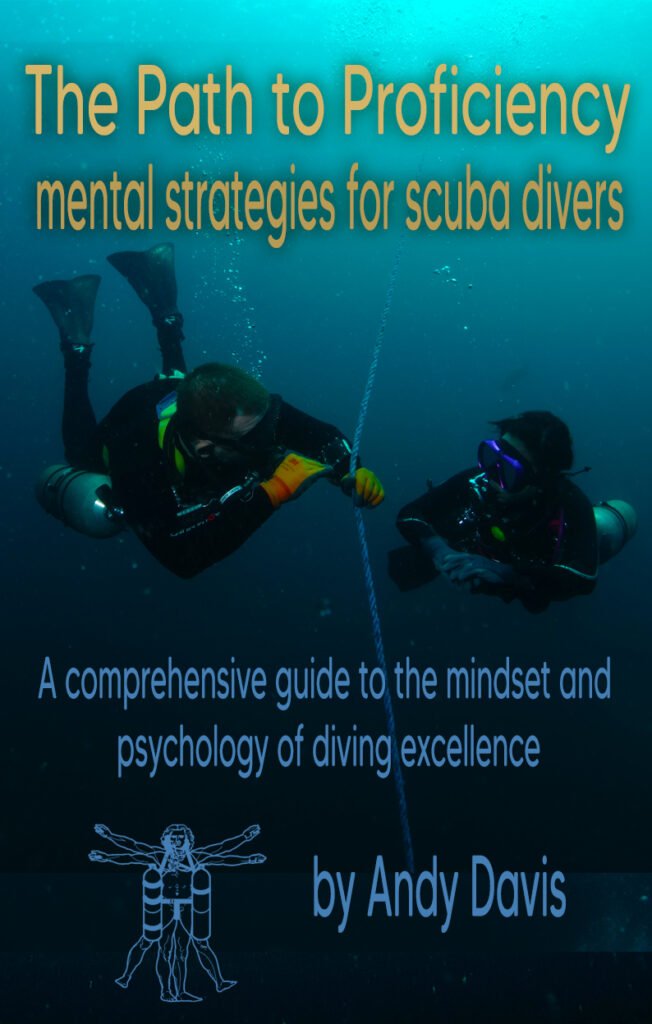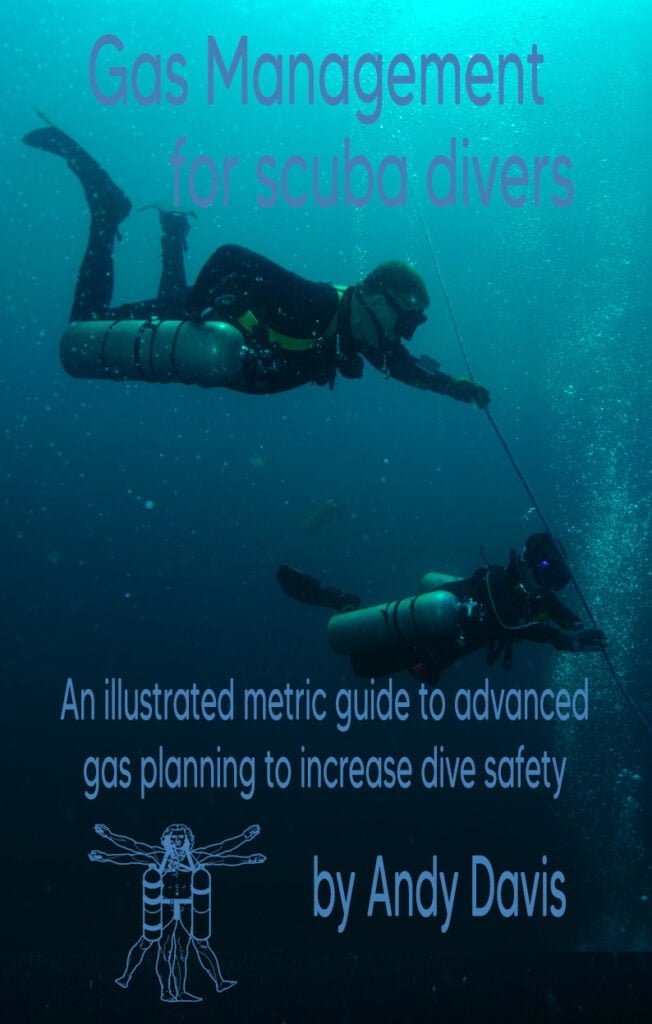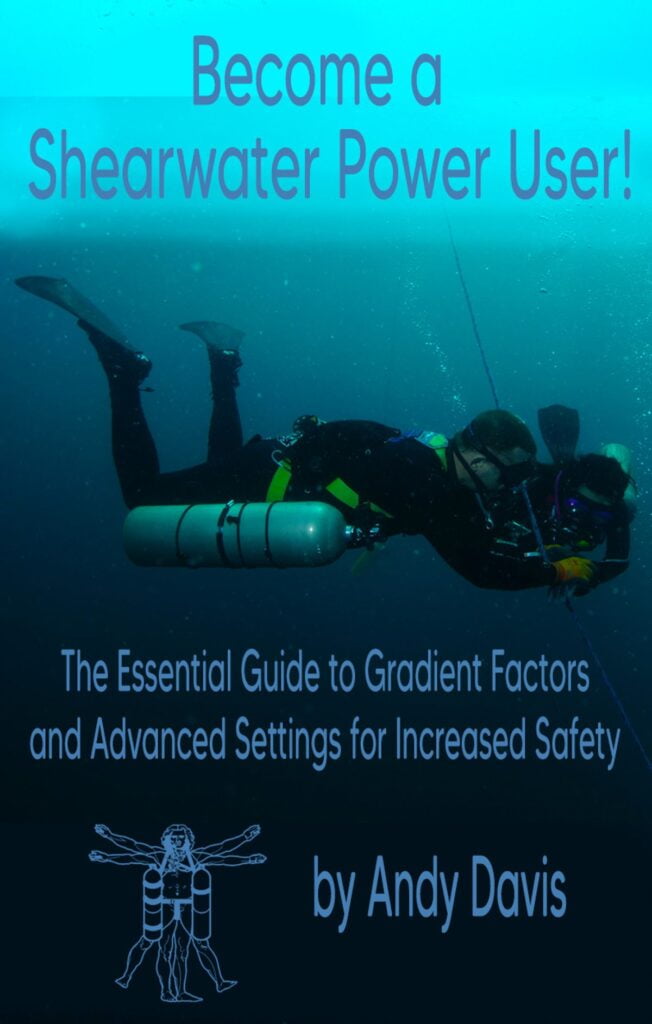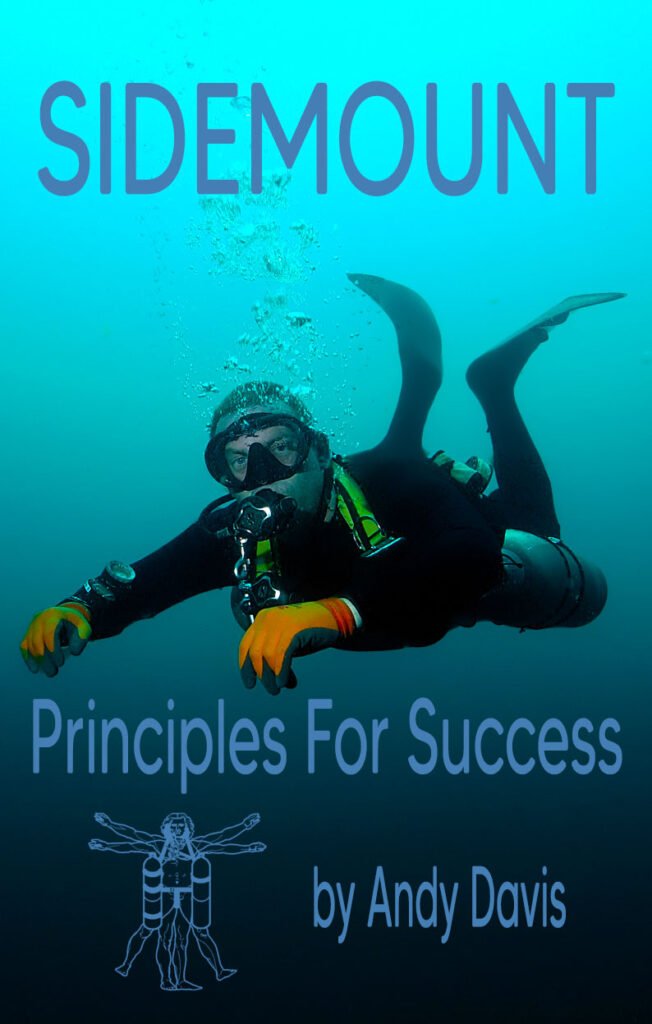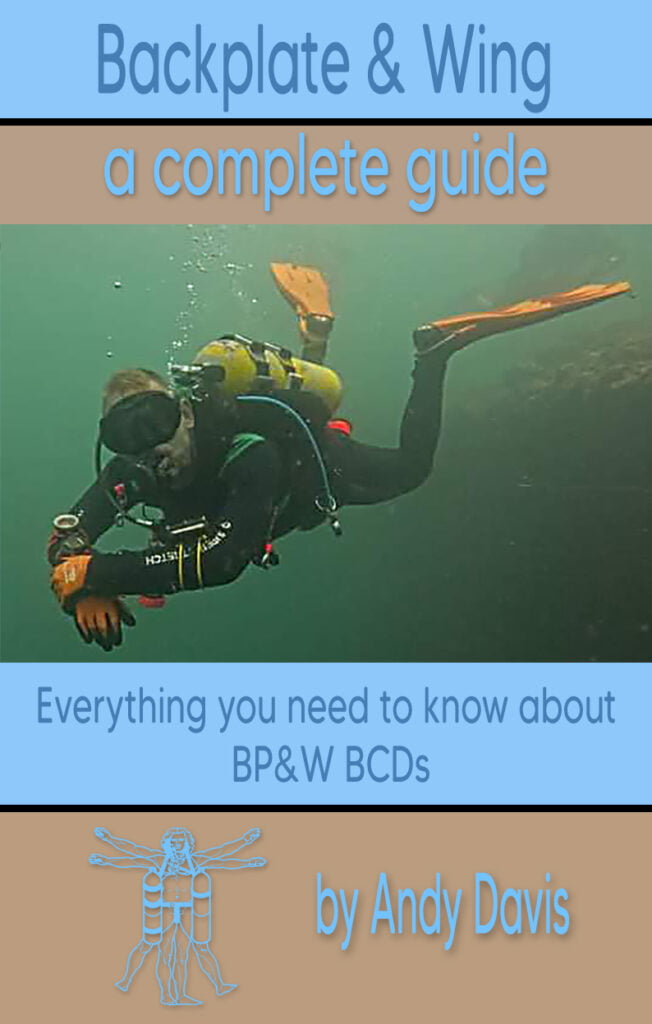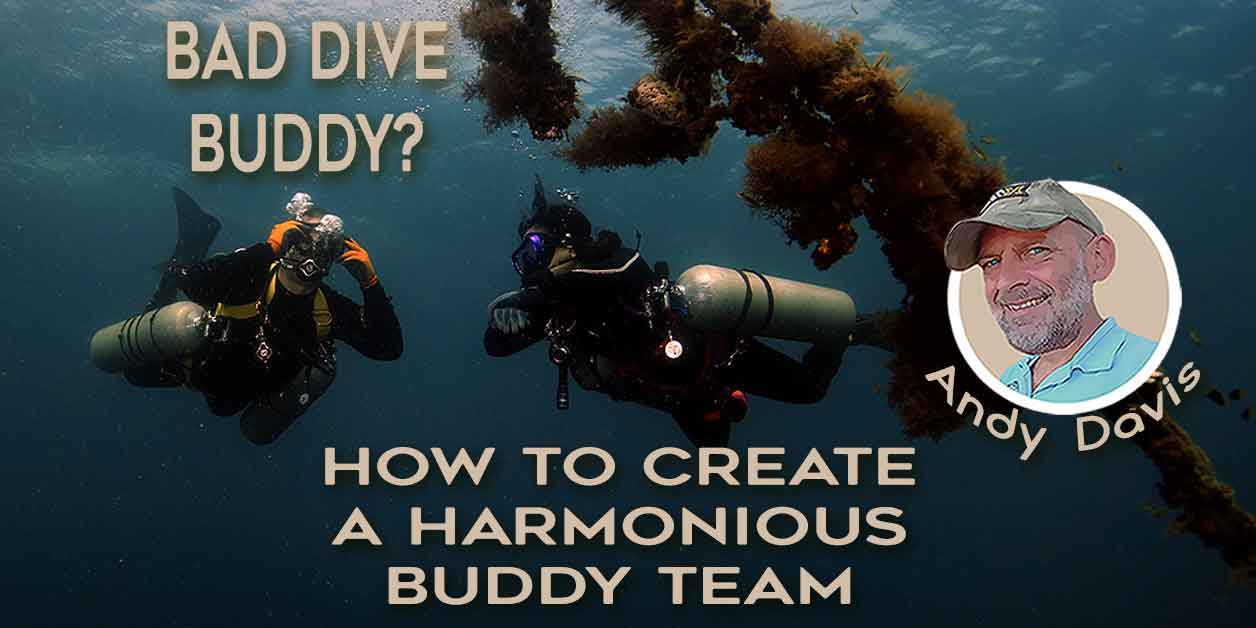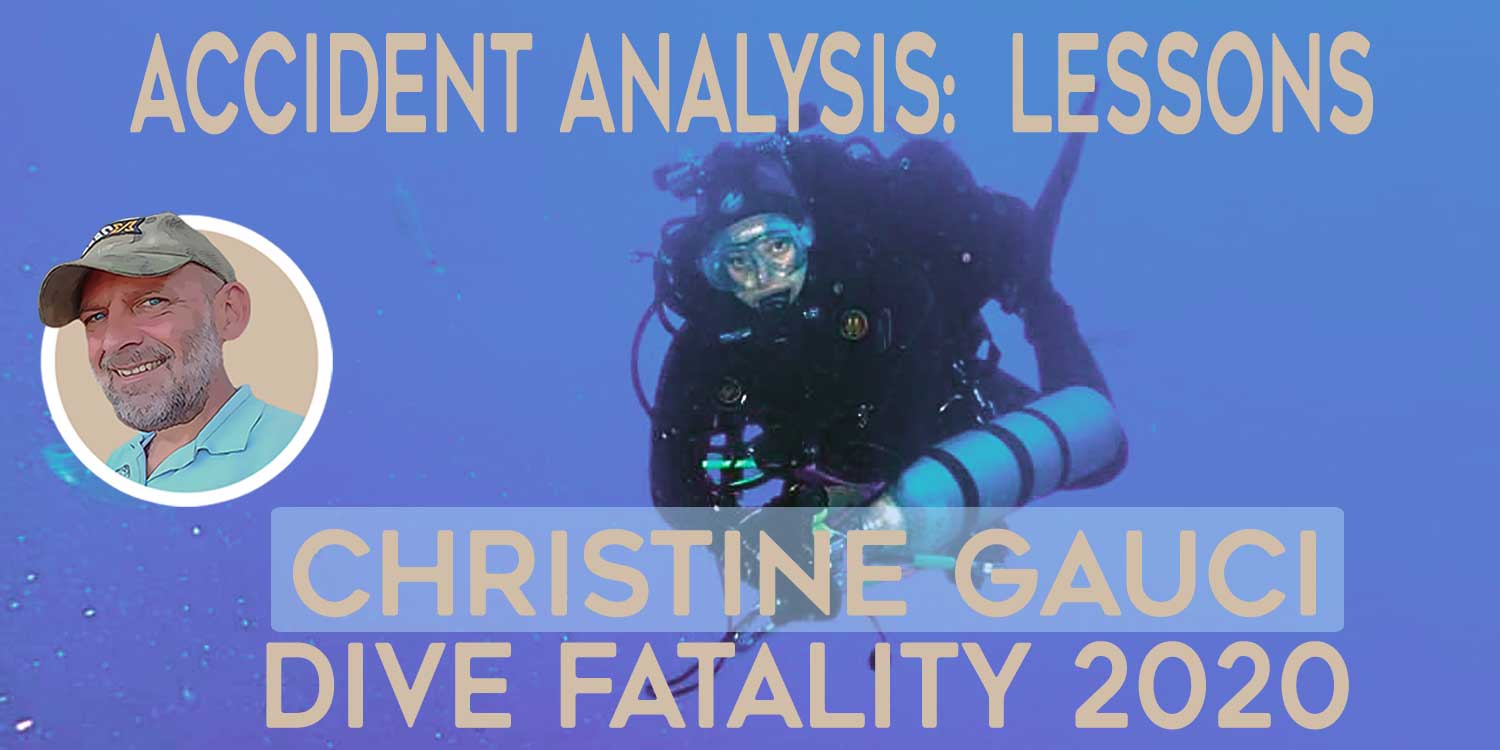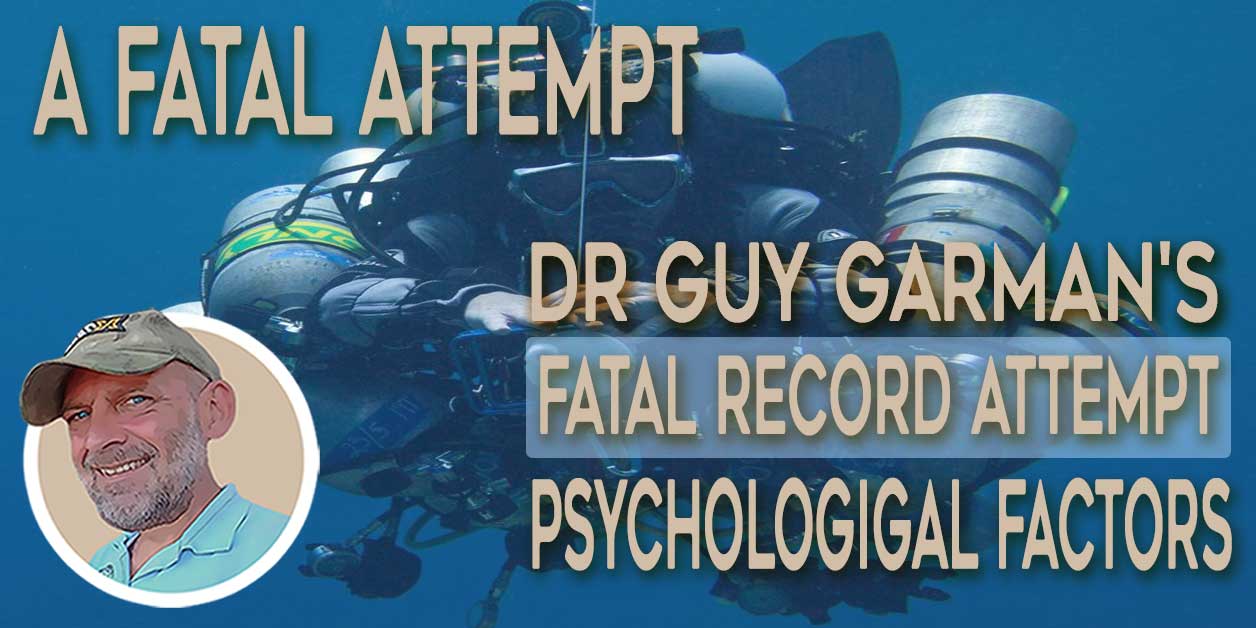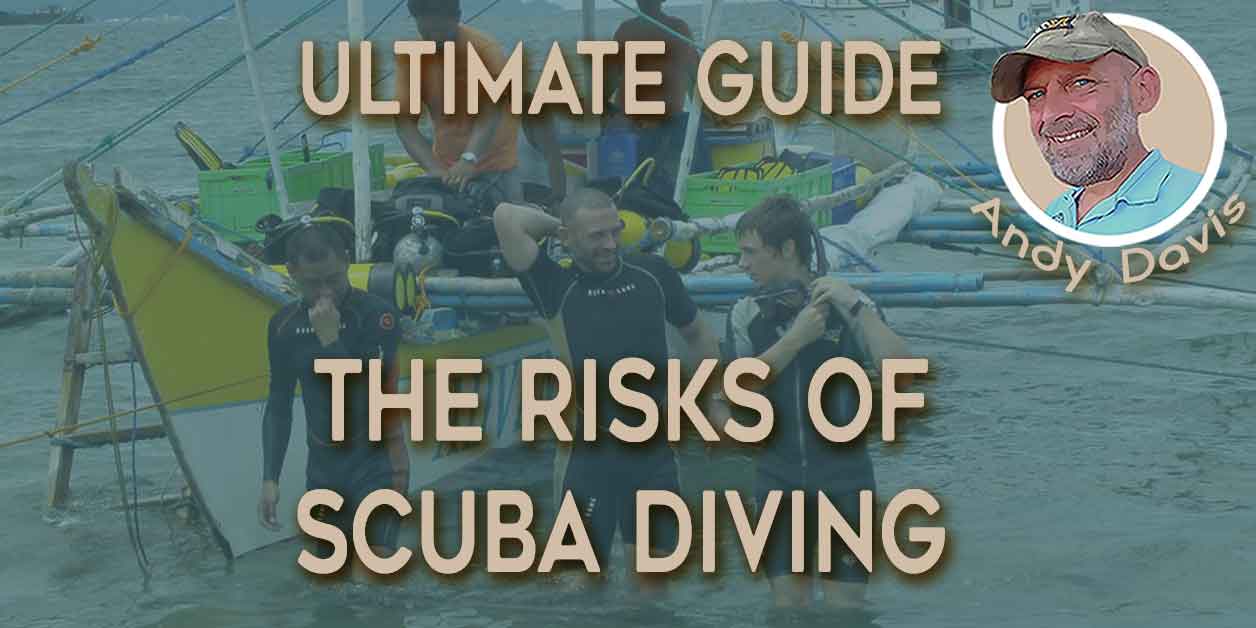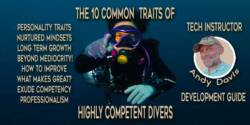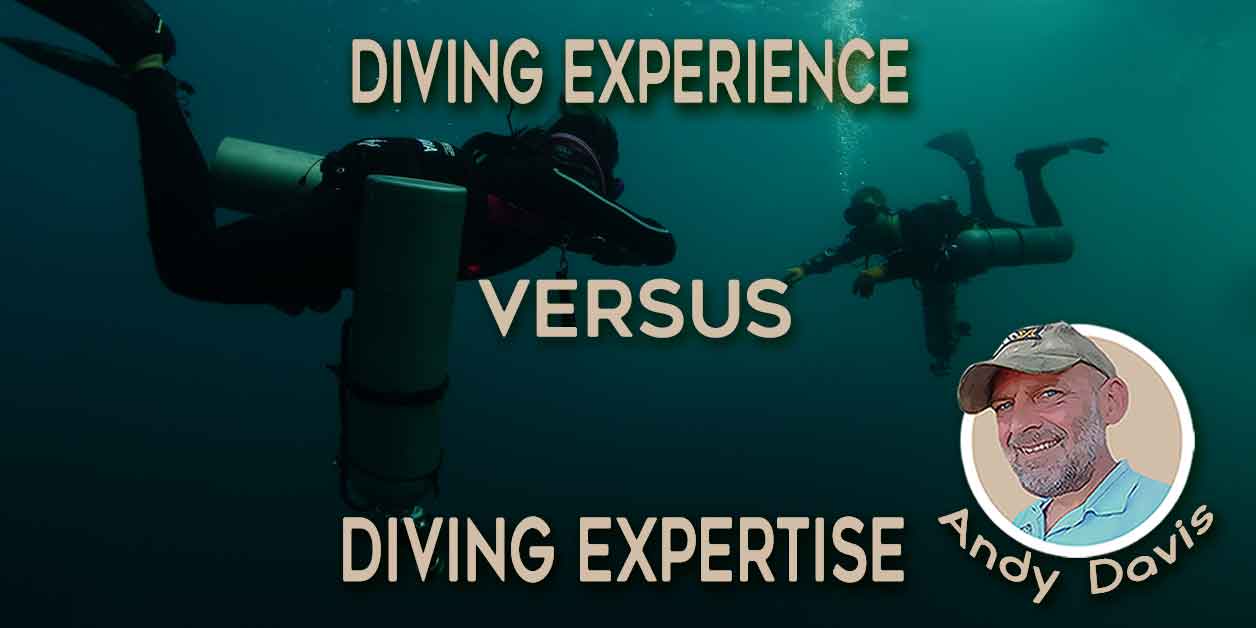Situational Awareness: The Most Neglected Diving Safety Skill
In scuba diving, safety reigns supreme. Every diver knows the importance of proper equipment, meticulous planning, and competent training. But in the pursuit of safer dives, there’s one vital skill often left in the shadows: situational awareness.
As we navigate the depths of this subject, I will explain what situational awareness truly is, why it is fallible, and what you can do to improve it.
Read on to learn about diving situational awareness—the most neglected, yet vital, skill for your safety beneath the waves.
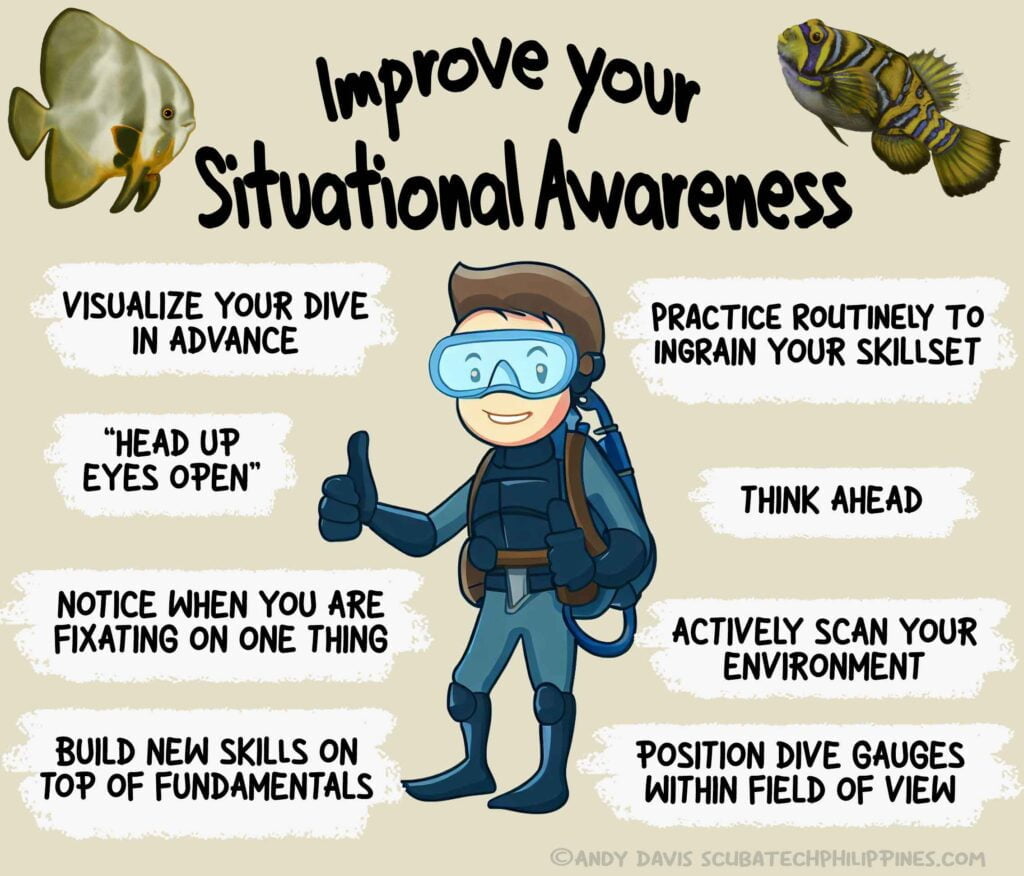
What is Situational Awareness?
Situational awareness (SA), is a fundamental cognitive skill. It involves understanding one’s situation through perceiving and analyzing multiple external stimuli. This, in turn, allows the person to make positive judgments that successfully address potential risks, hazards, or events that might occur.
Situational awareness is the ability to perceive, understand, and effectively respond to one’s situation.
This concept finds extensive relevance and application across diverse fields, ranging from aviation and military operations to emergency management, sporting performance, and our day-to-day experiences.
What Does Situational Awareness Include?
Situational awareness can be broken down into several key components:
- Environmental Understanding: Situational awareness involves having a profound grasp of the environment in which one operates. This encompasses factors like terrain, weather conditions, and the presence of relevant objects or individuals.
- Real-time Perception: It entails the capability to be acutely aware of ongoing events and developments in your immediate surroundings. This includes recognizing changes, movements, or anomalies.
- Future Projection: Situational awareness enables ‘mental time travel‘ to visualize and hold in mind what comes next, or is likely to occur. Called ‘mental representation‘ or ‘mental modeling‘ in the field of psychology, the clarity and accuracy of an individual’s real-time future perception is known to be a measure of their relative expertise in a task.
- Risk Assessment: Situational awareness extends to evaluating potential threats or opportunities that may arise within the environment. It encompasses the ability to discern what is relevant, important, or potentially dangerous.
- Contextual Comprehension: Situational awareness involves understanding how your actions and decisions fit within the broader context of the situation. This includes considering the consequences of your choices and their impact on the overall scenario.
- Decision-making: One of its crucial aspects is the capacity to make informed decisions based on the information gathered and analyzed. Effective decision-making is pivotal for adapting to changing circumstances and maintaining safety.
In essence, situational awareness is a dynamic process that encompasses:
- Information Gathering: Continuously collecting data from various sources.
- Information Processing: Analyzing and synthesizing the collected information.
- Mental Model Creation: Forming and maintaining a clear and accurate mental representation of the environment.
This skill is essential for a variety of contexts, from ensuring safety in high-risk activities, such as scuba diving, to improving everyday decision-making.
Why is Situational Awareness Important When Scuba Diving?
Situational awareness is paramount in scuba diving, just as it is in various sports and activities. It plays a pivotal role in ensuring the safety and success of a dive. Here are 5 reasons why:
- Safety: In scuba diving, safety is paramount. Situational awareness helps divers identify unexpected risks like equipment malfunctions, diving buddies in difficulty, or threats from dangerous marine life. Being aware of these factors allows divers to preempt emergencies, or react promptly to increase the chances of a successful outcome.
- Gas Management: Scuba divers rely on air tanks for breathing, and yet 41% of fatal diving accidents are connected to running out of gas. Continual awareness of gas supply levels is critical. Proper situational awareness ensures that divers are not impeded from monitoring their air consumption.
- Decompression: Hundreds of divers suffer DCS injuries each year due to exceeding a planned no-stop limit, bottom depth, or ascent speed. Improved situational awareness ensures that these failures can be avoided.
- Navigation: Underwater environments can be disorienting, with limited visibility and underwater currents. Situational awareness helps divers maintain a mental map of their dive site, ensuring they can navigate back to the entry point and avoid getting lost.
- Team Diving: The vast majority of divers utilize a buddy or team diving system for safety. Situational awareness allows divers to stay in sync with their dive buddies, observing for problems and intervening proactively to avoid accidents from occurring or amplifying.
Why Is Situational Awareness Fallible?
A major reason why situational awareness is prone to failure is inattentional blindness.
Inattentional blindness occurs when individuals fail to notice unexpected objects or events in their visual field because their attention is concentrated on something specific.
In short, inattentional blindness is when we become mentally fixated on one intensive mental task and lose awareness of the bigger picture.
- Our brains can only process one conscious task at a time.
- Intense focus on one thing reduces awareness of everything else.
- We fail to observe our wider environment, even when it is in plain sight.
- Unexpected stimuli are even more likely to go unnoticed.
It is important to understand inattentional blindness if you hope to improve your situational awareness as a diver. Furthermore, you must accept that you are very prone to it.
A Quick Awareness Test
Take a moment to test your inattentional blindness with this famous psychology example from Simons & Chabris (1999).
You are instructed to count how many times the players wearing white pass the basketball:
I am sure that the test made you laugh, and effectively demonstrated how easy it is to succumb to inattentional blindness.
What Causes Inattentional Blindness in Divers?
Inattentional blindness in divers can be caused by several factors, often related to the complex and visually-oriented nature of scuba diving.
Some key reasons for inattentional blindness in divers include:
- Task Overload: Divers often have to perform multiple tasks simultaneously.
- For instance, buoyancy and trim control, maneuvering, gas management, monitoring bottom time, navigation, and observing one’s buddy.
- In emergencies, even more complex tasks are required.
- Until tasks are ingrained to be performed unconsciously they can swiftly overload the diver’s cognitive capacity.
- Equipment Familiarity: Unfamiliar dive gear, along with a deficit of muscle memory to operate it, increases task loading upon the diver and demands more of their focus.
- A clear sign of weak equipment familiarity is the need to visually observe your hands when operating gear.
- Cameras, Videos, and Marinelife: The underwater world is captivating, but this also serves as strong competition for your awareness.
- That is especially true when divers focus their attention through the lens of a camera or GoPro.
- Navigation: Maintaining a sense of direction and navigating through underwater terrain requires concentration.
- Compass use is especially demanding on one’s attention.
- Divers may become so focused on navigating that they overlook other aspects of their environment.
- Psychological Factors: Psychological stress, anxiety, or excitement can also contribute to inattentional blindness.
- When you experience psychological stressors, adrenaline release tends to cause ‘tunnel vision’.
- While tunnel vision was evolved to prioritize response to a critical threat, it exposes us to other risks.
- Diving has risks that we have not evolved to deal with.
- Focusing exclusively on one immediate stressor can allow an accident spiral to occur.
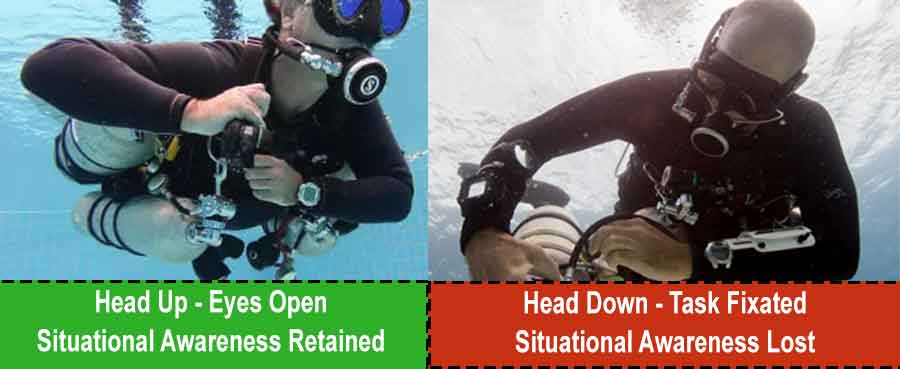
How To Improve Diving Situational Awareness
Situational awareness doesn’t magically improve over time; it requires intentional effort to develop.
Our brains tend to isolate focus on unfamiliar or infrequently performed tasks to limit external distractions. Cultivating mental discipline is essential to overcome this natural tendency.
Develop Ingrained Skills
I have explained that having to focus on performing a task will cause inattentional blindness. To avoid that, you must practice skills sufficiently so that they become ingrained as ‘muscle memory‘.
When skills can be performed unconsciously they do not contribute to task loading or demand the fixation of your attention.
- Isolate and practice micro-skills: Within any large skill, there are numerous smaller sub-skills.
- For instance, clipping a boltsnap on and off a D-ring is a constituent skill of many, more complex skills.
- Identify and practice micro-skills until they are fluid and unconscious.
- Dry skill practice: The chances to practice your diving skillset are limited by opportunities to dive.
- However, some skills, especially micro-skills, can be easily and conveniently practiced on dry land.
- You’d be surprised how many diving skills can be developed in your living room.
- Blindfold skills practice: Skills become ingrained quicker when they can be practiced without vision.
- Try practicing known skills with a blindfold, or just close your eyes.
- Your brain is forced to focus on the tactile feedback it gets and forge new neural pathways for skill performance.
- Removing vision from the exercise can also improve your proprioception (kinesthesia).
- Choose instructors who allocate more training time: Not all dive training courses are equal. If you want to develop ingrained skills then you need to find an instructor who schedules ample training time.
- There is a big difference between training just enough to get a skill right once, and training sufficiently to permanently ingrain it.
- Such training takes longer, and this usually costs more, but can offer a far better return on investment.
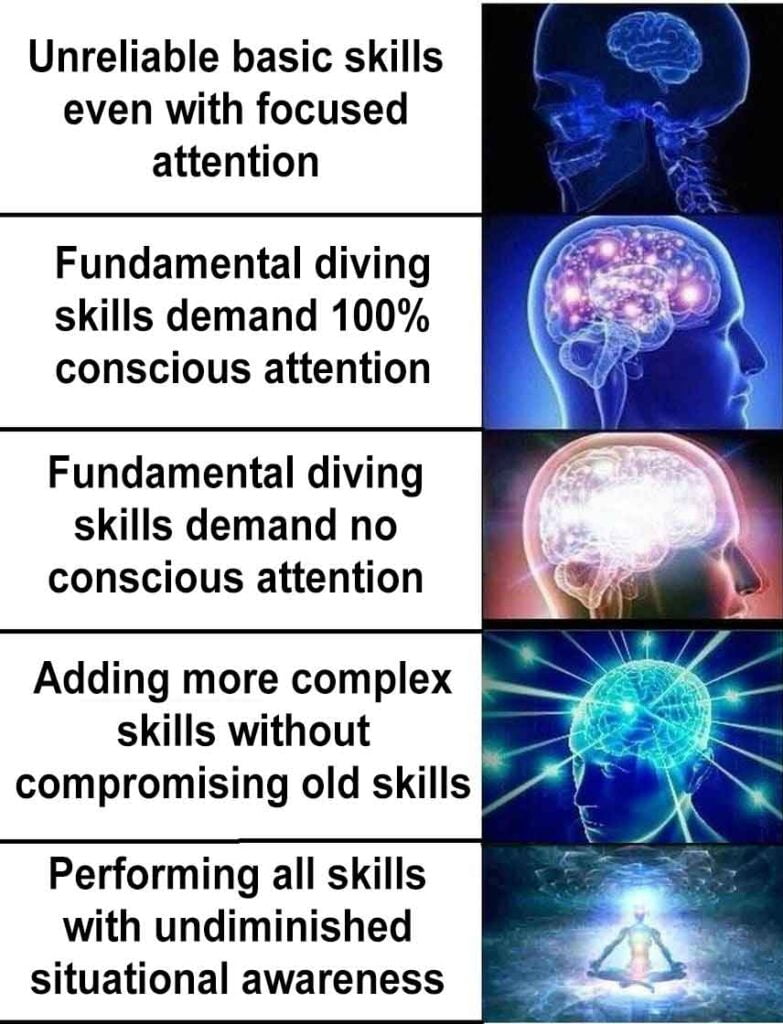
Develop Your Skillset On Top Of Situational Awareness
Sadly, it is a common practice in dive training to practice skills in isolation. For instance, divers might kneel on the bottom with negative buoyancy to repeat new skills.
For sure, that singular focus might speed up the acquisition of a specific skill. In turn, that allows courses to be run more quickly and profitably. However, it also conditions divers to become inattentionally blind. As such, it is the antithesis of developing situational awareness.
Promoting weak situational awareness is a bad trade-off for the convenience of a slightly shorter and easier training course.
It may be more effortful, but forcing yourself to retain situational awareness when performing skills forces the brain to more quickly integrate that task as an unconscious ‘habitual’ process. The payback is a quicker reduction in task loading and more cognitive ease.
You should recognize that it is natural for your brain to try and isolate focus on unfamiliar tasks. It does so by reducing distracting external stimuli. You have to cultivate the mental discipline to overcome that innate cognitive tendency.
With my own students, I emphasize the development and continual retention of situational awareness:
- “Head up, eyes open“: retain a constant appreciation of what’s going on around you.
- I do not consider a diving skillset to be reliably functional until it has reached a level where performing one requirement doesn’t detract from performing other simultaneous tasks.
- I instruct my students to maintain eye contact throughout drills and skills. They have to respond to communication and external stimuli immediately, regardless of what they are doing.
- This makes training much harder but reaps far better results for the effort.
I consider it a significant “red flag” when I see supposedly advanced or technical divers retreat mentally into their own little internal world whenever they are task-loaded.
Use The HUD Approach
You can enable better situational awareness by putting key diving information within your field of view. This is akin to how information is presented conveniently on an aircraft’s ‘Head Up Display’ (HUD).
- Opt for wrist-mounted computers and compasses.
- Keep SPGs on a bolt snap attached to a BCD D-ring.
- Develop the micro-skill of unclipping the bolt snap and reading your SPG within your field of view.
If driving a car, you wouldn’t drive down the road with your focus primarily on the speedometer. Likewise, when diving, you shouldn’t fixate on your gauges.
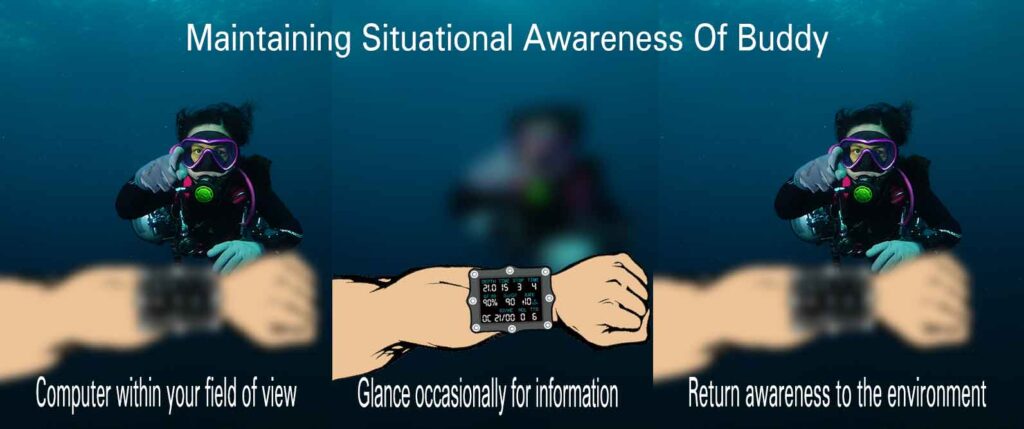
Active Scanning
Active scanning helps maintain situational awareness when diving. Initially, divers must consciously develop this ability, but over time it will become an ingrained habit.
- Frequency: Scan regularly; increase frequency under high workload or stress. Scan immediately after being distracted by intense task focus, if you perceive tunnel vision, or whenever there are significant environmental changes.
- Method: Keep your head up, eyes open, and focus on the bigger picture. Pause to assess gas, depth, and time. Check your buddy’s condition.
- What to Look For: Monitor gas supply, bottom time, depth, location, and buddy status. Observe for unexpected environmental hazards, changing water conditions, and marine life hazards.
- Identifying Danger: Continuously assess if anything might disrupt the dive plan or jeopardize safety.
Active scanning ensures divers stay alert and respond effectively to changing conditions, promoting safety.
Some Tips For More Vigilant Diving
- Try to develop a habit of regaining situational awareness whenever you have been momentarily distracted on your dive.
- Recognize when you are about to perform focus-intensive tasks, such as DSMB deployment, mask clearing, or gas switches, that will degrade your situational awareness.
- Inform your buddy when you will be awareness compromised so that they can observe and support you more closely.
Purchase my exclusive ebook!
A comprehensive guide to the mindset and psychology of diving excellence.
$20 Printable PDF Format, 298 pages
Start Improving Your Situational Awareness On Your Next Dive
Remember, beneath the waves, your best companion is keen situational awareness. Equip yourself with this often-overlooked, yet paramount, skill. Forge it into your diving routine, and you’ll embark on future dives with greater confidence.
Situational awareness, often neglected or undermined in diving education, deserves the spotlight when it comes to developing dive safety.
So, as you embark on your underwater adventures, remember this: the most neglected diving safety skill might just be your most valuable asset. Develop your ability, stay vigilant, and know that situational awareness is your trusted companion beneath the surface.
Further Reading on Situational Awareness
Situational Awareness and Decision Making in Diving. Guy Shockey, InDepth Magazine, 2020.
About The Author

Andy Davis is a RAID, PADI TecRec, ANDI, BSAC, and SSI-qualified independent technical diving instructor who specializes in teaching sidemount, trimix, and advanced wreck diving courses.
Currently residing in Subic Bay, Philippines; he has amassed more than 10,000 open-circuit and CCR dives over three decades of challenging diving across the globe.
Andy has published numerous diving magazine articles and designed advanced certification courses for several dive training agencies, He regularly tests and reviews new dive gear for scuba equipment manufacturers. Andy is currently writing a series of advanced diving books and creating a range of tech diving clothing and accessories.
Prior to becoming a professional technical diving educator in 2006, Andy was a commissioned officer in the Royal Air Force and has served in Iraq, Afghanistan, Belize, and Cyprus.
In 2023, Andy was named in the “Who’s Who of Sidemount” list by GUE InDepth Magazine.
Purchase my exclusive diving ebooks!
Originally posted 2023-09-20 22:20:12.

